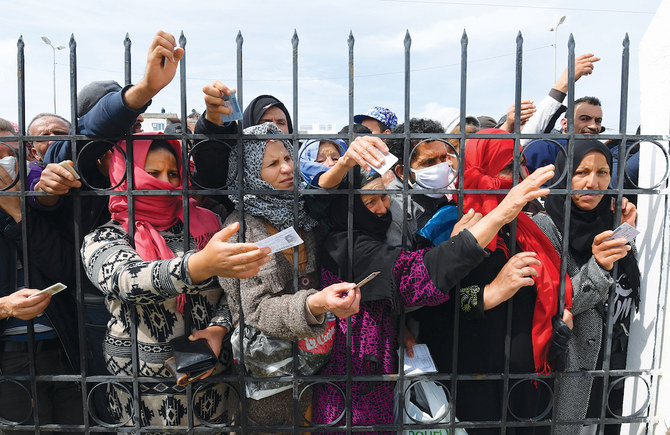DUBAI: First identified in India, the highly transmissible delta variant of the coronavirus has since been detected in around 100 countries, prompting new waves of infections, travel restrictions and concerns over the effectiveness of vaccines.
One region that has been especially hard hit is North Africa, where the economic havoc caused by lockdowns forced governments to reluctantly reopen borders and businesses in recent months despite the slow pace of inoculation.
Tunisia, with a population of 11.69 million, has reported 582,638 infections and 19,336 deaths since the pandemic was declared in March 2020, making it one of the worst-hit nations in Africa, alongside Namibia, South Africa, Uganda and Zambia.
The collapse of the health system and severe economic hardship triggered mass protests that in turn have plunged the country into a political crisis.
War-ravaged Libya has also witnessed an alarming surge of COVID-19 cases over the past month. Because of its two centers of political power with parallel institutions, its response and vaccination rollout have been disjointed and sluggish.
The country’s National Center for Disease Control (NCDC) recorded 3,845 new COVID-19 cases on July 25 — at that time the highest daily rate since the onset of the pandemic.
Libya has recorded roughly 246,200 cases and 3,469 deaths, but the true figure is likely far higher given the country’s acute shortage of tests and laboratory capacity.
“We are alarmed at the rapid spread of the virus in the country,” AbdulKadir Musse, UNICEF Special Representative in Libya, said in a statement.
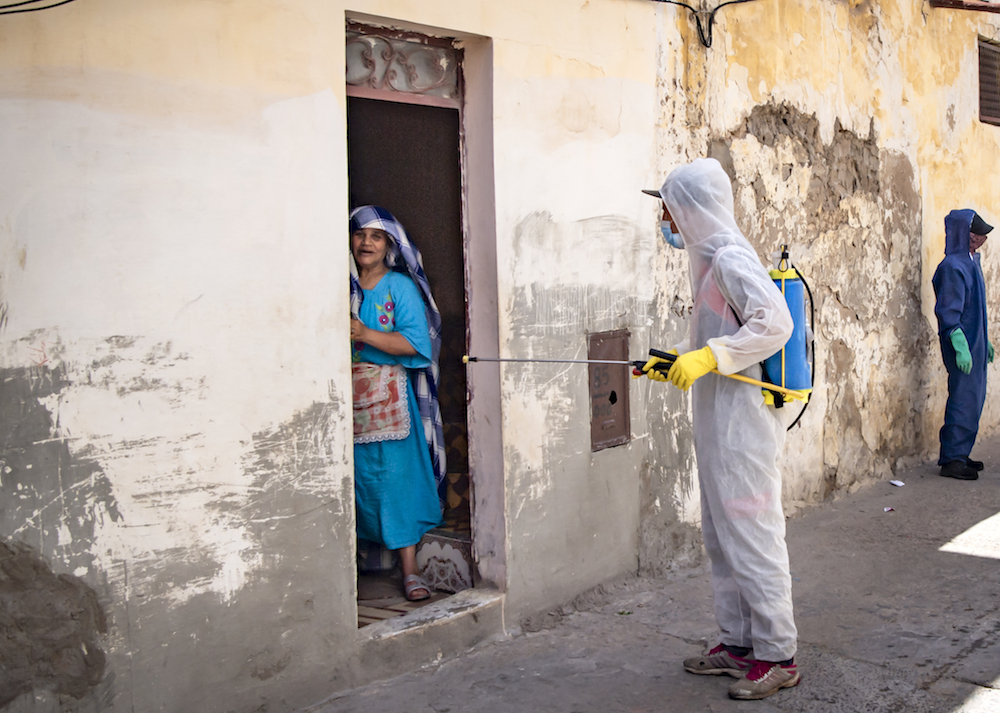
A Moroccan municipal worker disinfects outside a house in a closed street in the southern port city of Safi on June 9, 2020 after Moroccan authorities declared a total lockdown. (AFP/File Photo)
“The vaccination rate is very low, and the spread is fast. We must be quicker in our response. The most important thing we can do to stop the spread of COVID-19 and the variants, is ensure everyone who is eligible gets vaccinated.
“Countries with high coverage of two doses of vaccines have been able to drastically reduce the rate of hospitalization and deaths. We also need to follow and abide by preventive measures.”
Also known by its scientific name B.1.617.2, the delta variant was first detected in the Indian state of Maharashtra in October 2020, but was only labeled a “variant of concern” (VOC) by the World Health Organization (WHO) on May 11 this year.
The strain, itself the product of multiple mutations, is thought to be 60 percent more infectious than the alpha (or Kent) variant, an earlier mutation that emerged in southern England in November 2020.
READ MORE
Arab countries of North Africa have particularly felt the economic pain of the coronavirus crisis. Find out why here.
In many countries, including the UK, delta has now become the dominant strain. Although it is thought to cause more severe symptoms than its ancestor variants, placing additional strain on health services, there is currently not enough data to suggest it is more deadly.
More encouraging is the data on the effectiveness of vaccines. A study by Public Health England found the Pfizer vaccine was 94 percent effective against hospitalization after one dose and 96 percent effective after two doses, while AstraZeneca was 71 percent effective after one dose and 92 percent effective after two.
This is all good for countries with high rates of vaccination such as the UK. But for countries in the developing world, including the Arab states of North Africa, the slow rollout of vaccines means there is limited protection against the virus.
Delta is taking a terrible toll in these countries, leaving hospitals overburdened and mortuaries short of space.
Africa as a whole recently recorded a 43 percent week-on-week rise in COVID-19 deaths. Hospital admissions have increased rapidly and countries face shortages of oxygen and ICU beds.
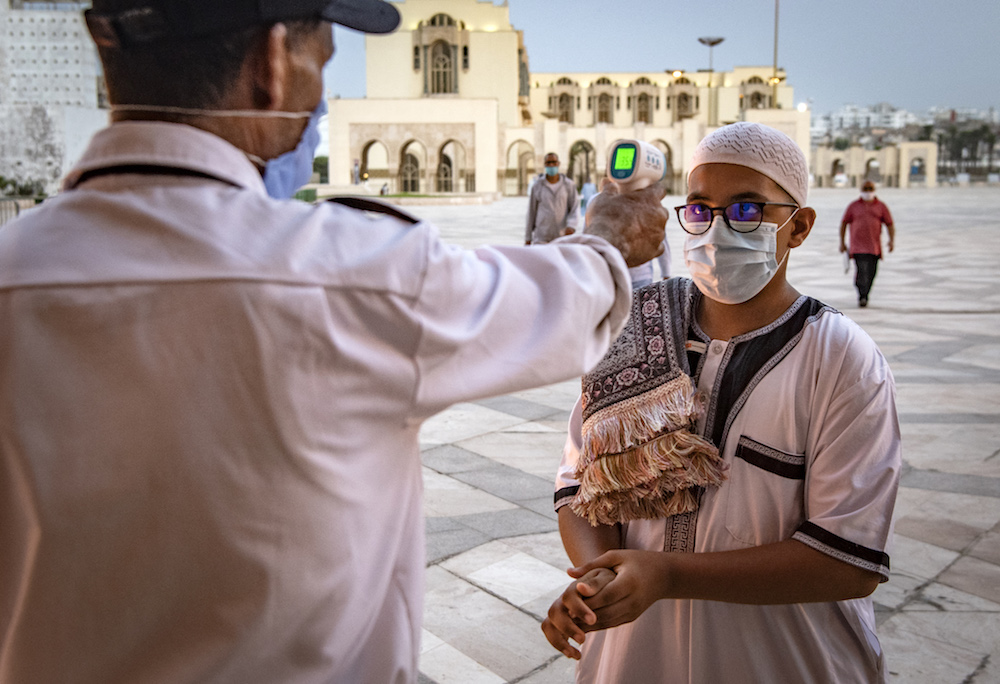
A mask-clad worker measures the body temperature of incoming Muslim worshippers arriving for prayers at the Hasan II mosque, one of the largest in the African continent, in Morocco's Casablanca. (AFP/File Photo)
According to the WHO, the continent has vaccinated around 52 million people since the start of the rollout in March and only 18 million are fully vaccinated, representing 1.5 percent of the continent’s population compared with more than 50 percent in some high-income countries.
South Africa, with its population of almost 60 million, has recorded 2,422,151 cases and 71,431 deaths since the pandemic began. Based on deaths per head of the population, Tunisia tops the region.
However, the picture is not uniform across the region. To date, 1.63 percent of Egyptians and 1.68 percent of Algerians have been fully vaccinated, compared with 27.68 percent of Moroccans, and 8.24 percent of Tunisians. Just 0.43 percent of Sudanese have received two doses, while data for Libya is unavailable.
“Different countries have different epidemiological situations, so we can’t generalize all of North Africa,” Abdinasir Abubakar, head of the Infectious Hazard Management Unit at the WHO regional office in Cairo, told Arab News.
Some countries have “really invested so much in vaccination and this is paying off,” while other countries have focused on enforcing public-health measures to slow the spread of the virus, he said.
“I think Morocco has really made a great investment and progress on administering more people with the vaccine compared to a number of other countries. And the cases you see are actually very minimal compared to previous waves, so I wouldn’t worry much about Morocco,” Abubakar said.
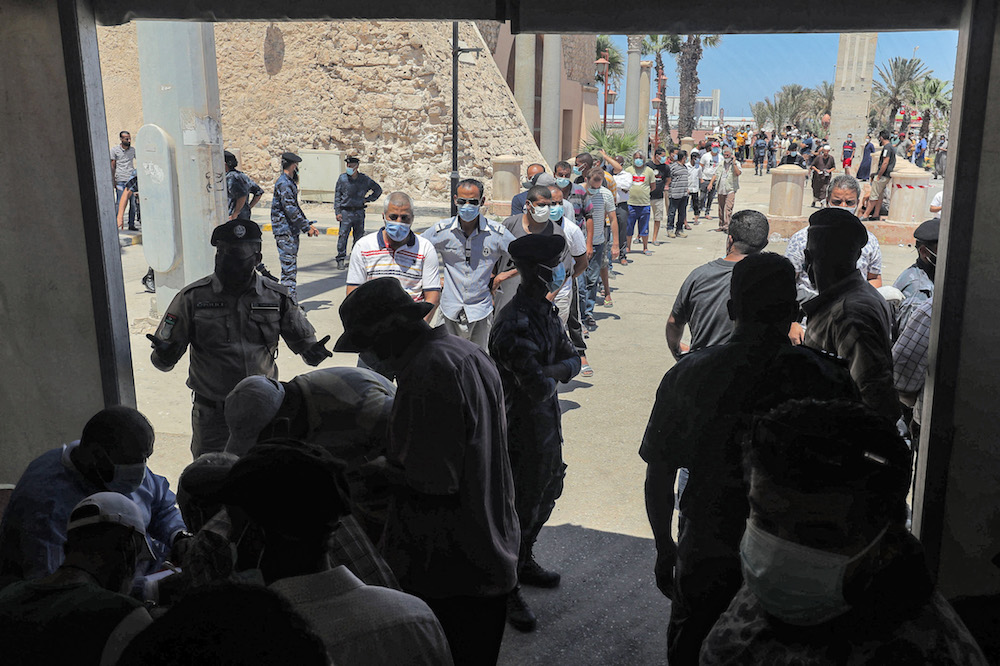
People queue as they arrive outside a make-shift COVID-19 coronavirus vaccination and testing centre erected at the Martyrs' Square of Libya's capital Tripoli on July 24, 2021. (AFP)
Nevertheless, cases in Morocco have been steadily increasing since mid-May, prompting the government to announce an extension of its state of emergency until Aug. 10.
Having already inoculated older age groups, Moroccan health authorities are now offering vaccines to people over the age of 30. But compliance with social-distancing and other hygiene regulations appears to be slipping.
“In Casablanca, I saw many people wearing masks but without adhering to other physical and social-distancing measures,” said Um Ahmad, who recently returned to Dubai following a family visit.
“I saw crowds on the streets and in markets as usual. And when I visited Fez, I saw people living normally with no precautionary actions whatsoever. I even asked my relative ‘are we on a different planet?’”
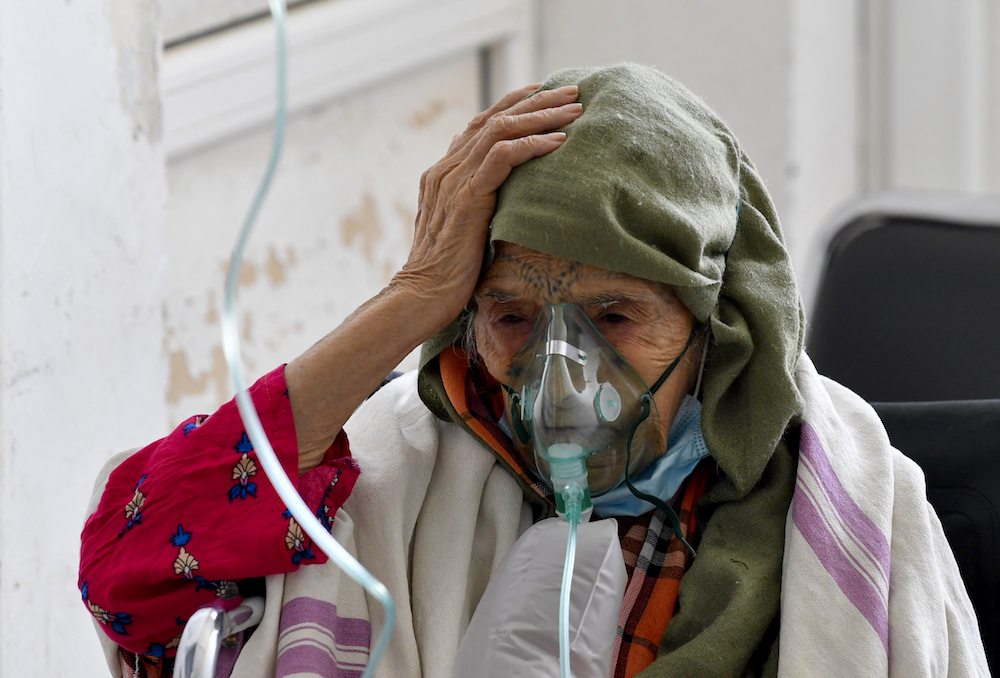
A Tunisian woman infected by the COVID-19 coronavirus receives oxygen at the Ibn al-Jazzar hospital in the east-central city of Kairouan. (AFP/File Photo)
In Algeria, which decided to close its borders to curb the spread of the delta variant, there is another more pressing problem — a shortage of oxygen in its hospitals to treat the seriously ill, forcing the government to establish a special unit to supervise the distribution of oxygen cylinders.
Egypt has reported a recent decline in the number of COVID-19 cases, with officials recording less than 70 new infections and less than 10 deaths per day. The country has even started sending its surplus medical kits to Tunisia.
But here too, public compliance with social-distancing measures leaves much to be desired. Eman Amir, an Egyptian working in Dubai who traveled to Cairo in May to visit her ailing mother, said she was shocked by the public’s relaxed attitude toward virus containment.
“Those who don’t care whether they die of coronavirus are those who feel they have little to lose given their already precarious existence,” she told Arab News, referring to contract and informal-sector workers most affected by pandemic restrictions.
In neighboring Sudan, cases are surging, particularly in the eastern city of Port Sudan, capital of the Red Sea State.
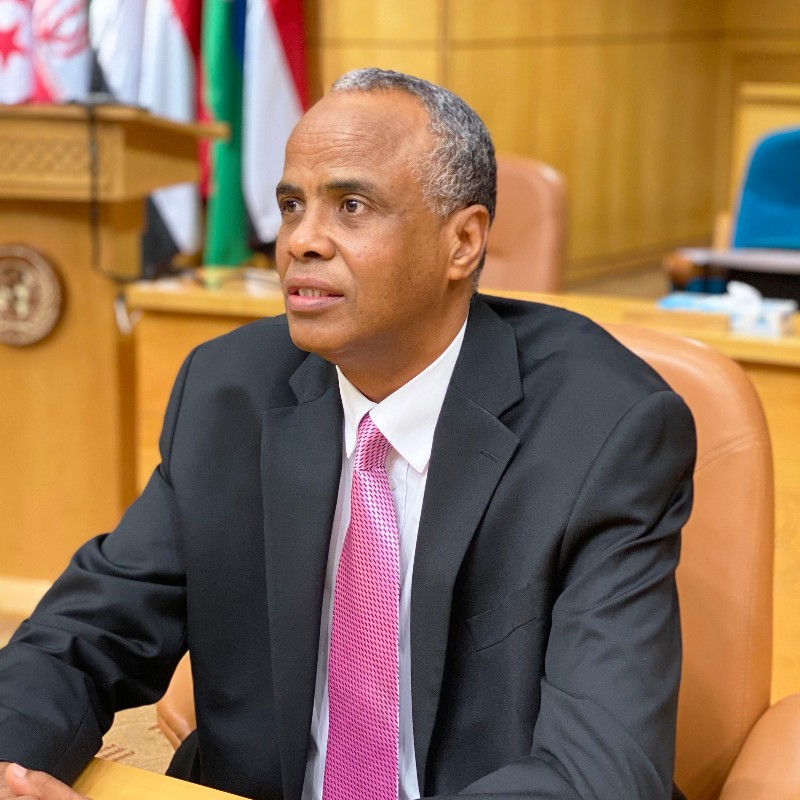
Abdinasir Abubakar, head of Infectious Hazard Management Unit, WHO Regional Office for the Eastern Mediterranean. (Supplied)
Dr. Ahmed Dreyer, the state’s director of the Emergency and Epidemic Control Department, has urged authorities to impose a three-week lockdown — known in policy circles as a circuit breaker — to help contain the spread of the delta variant.
Hana, a young Sudanese woman who lives with her family in Dubai, says many people back home are still not convinced the coronavirus even exists — the product, it would seem, of widespread misinformation.
“People have enough problems to worry about,” Hana said. “They don’t want to add to them and worry about the pandemic.
“They try to lead normal lives, by earning their livelihood and putting bread on the table.”
---------------
Twitter: @jumanaaltamimi




